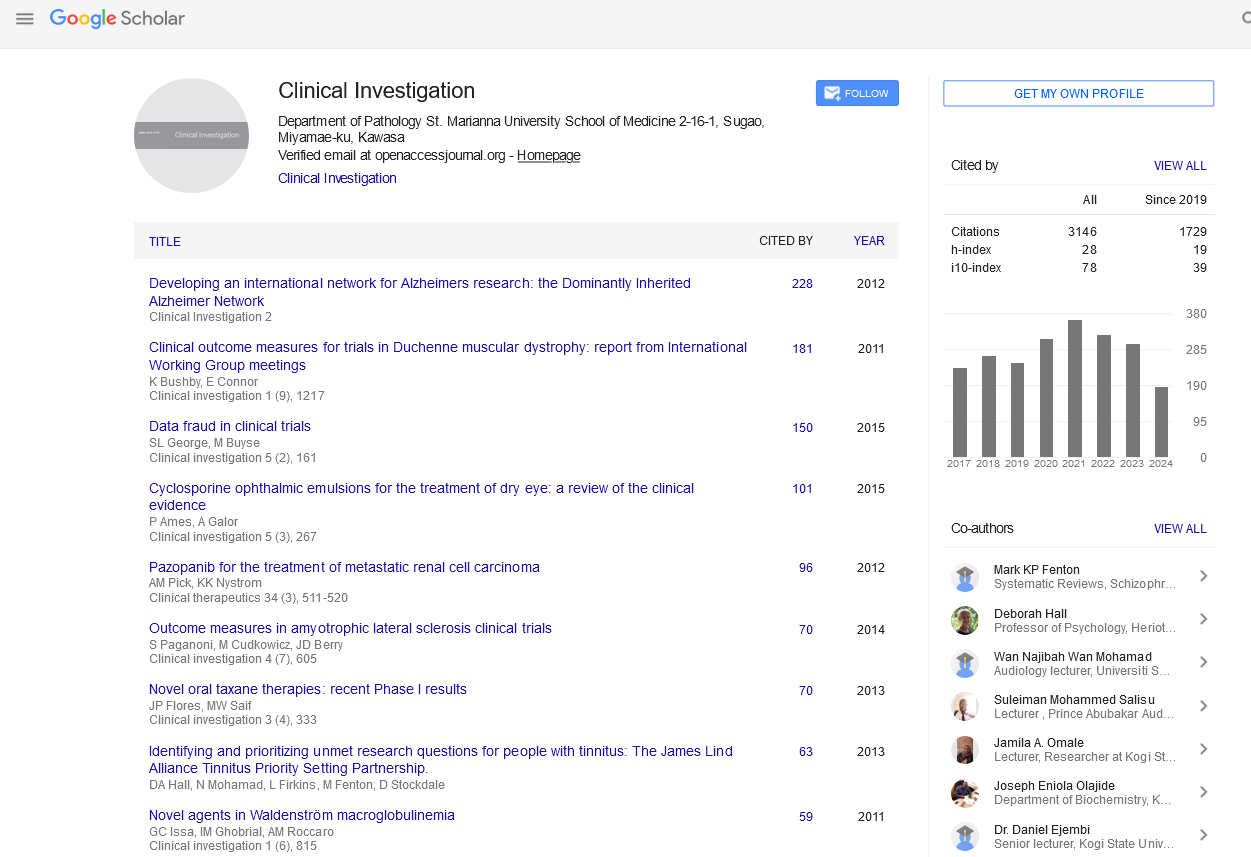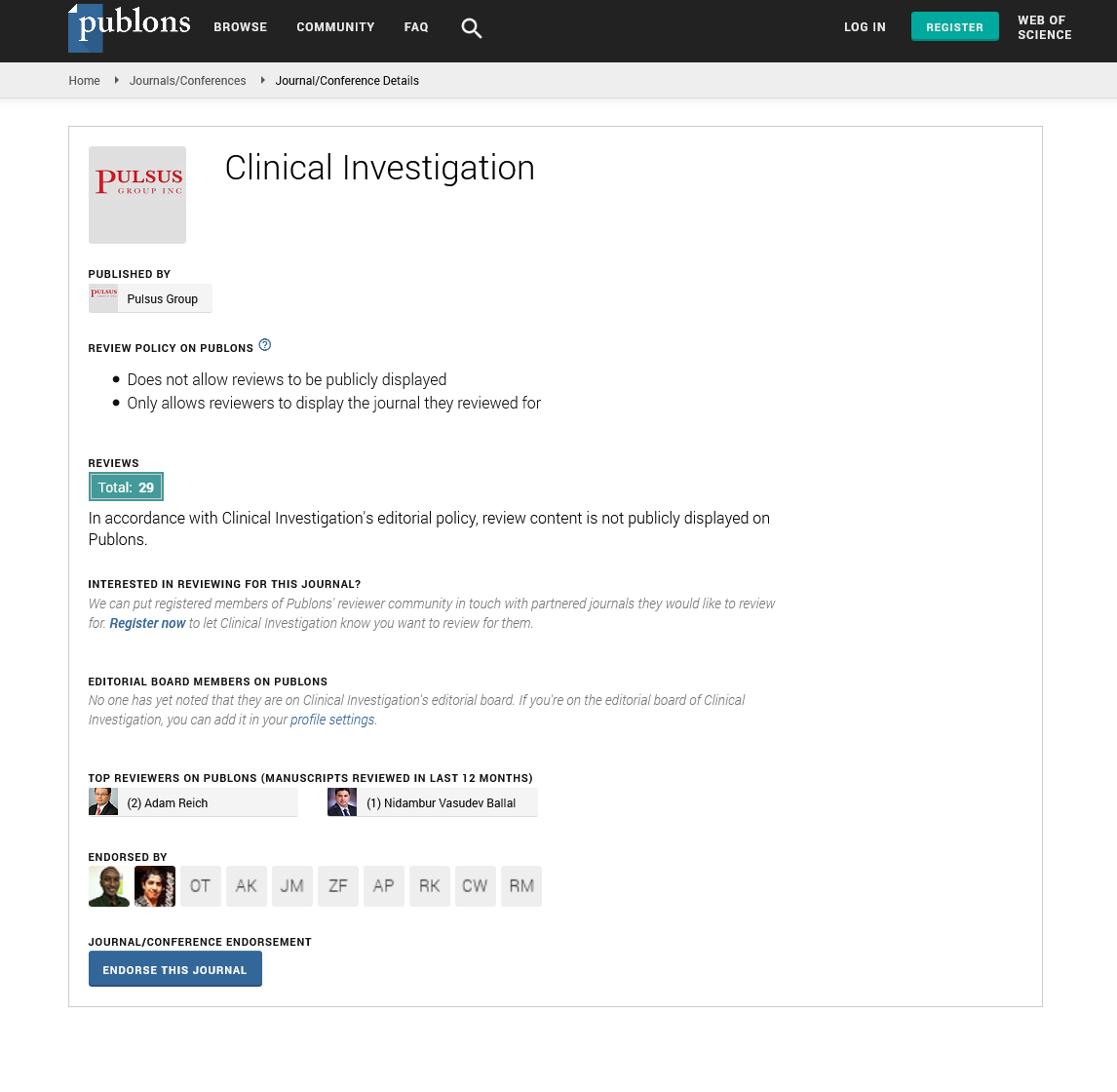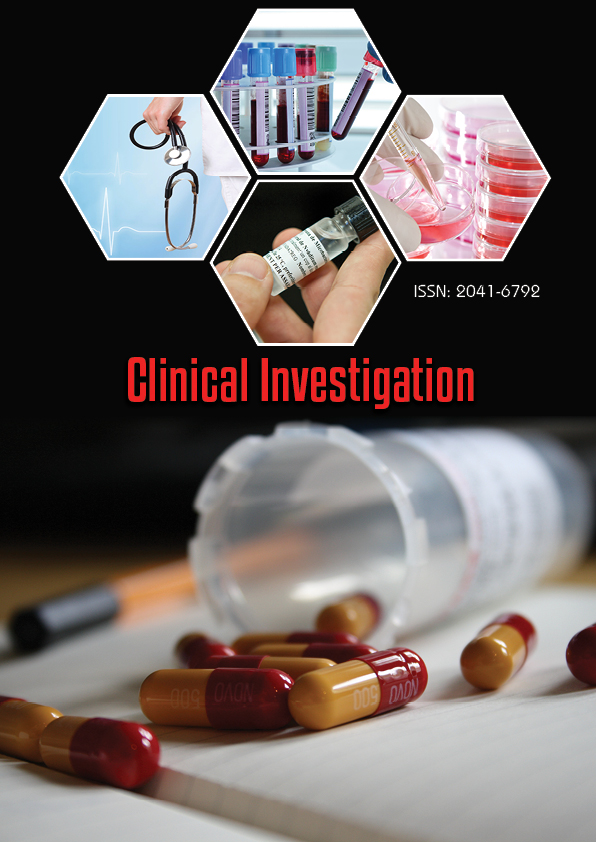Case Report - Clinical Investigation (2023) Volume 13, Issue 4
Case report: Intranasal Spravato (Esketamine) use in treatment-resistant major depressive disorder in a patient with significant psychosocial stressors
- Corresponding Author:
- Anastasia Masle
St.George's University School of Medicine, Grenada, West Indies
E-mail: vnukovasemey@gmail.com
Abstract
Millions of people in the US are affected by depression which causes a significant decrease in quality of life and daily functioning for affected individuals. In many cases, depression persists despite multiple treatments, and medical professionals are always looking for new methods to alleviate the burden of depression. Our case report describes an observation of Spravato treatment in a patient with treatment-resistant depression who has a history of significant psychosocial stressors. Psychosocial factors can play a significant role in treatment outcomes for patients across different fields of medicine. Helping the patient to build effective coping skills to deal with life stressors and to find adequate social support could positively contribute to successful treatment of the disease.
Keywords
Depression • Anxiety • Spravato • Treatment resistant depression • Esketamine
Introduction
According to the National Institute of Mental Health depression is one of the most common mental disorders in the United States. In 2020, over 14 million or 6.0% U.S. adults had at least one major depressive episode in the past year. One of the challenging subsets of Major Depressive Disorder is a Treatment-Resistant Depression (TRD), which is characterized by a lack of response to treatment by the patient with at least two antidepressants. Several approaches exist for treatment management including “the use of antidepressant strategies, such as increasing the dose of the antidepressant, augmentation strategies, combination strategies, and switching strategies, electroconvulsive therapy, and cognitive behavioral therapy”. Multiple factors can affect the treatment including “partial compliance or noncompliance, rapid metabolism, and the presence of severe psychosocial stressors”. Poor or absent social support system and psychosocial stressors are associated with poor outcomes for depressed patients. The literature demonstrates the “harmful consequences of poor social support and the protective effects of having access to rich and functional social networks on maintaining physical and psychological health”. One of the newer and promising FDA-approved medications for treatment-resistant depression is Intranasal Spravato spray (Esketamine). Spravato is the S-enantiomer of racemic ketamine, non-selective, non-competitive antagonism of N-Methyl-D-Aspartate (NMDA) receptors, used along with an antidepressant. Due to the risk of abuse and psychological dependence it is administered at a doctor's office, clinic, or hospital only. Spravato may cause “sleepiness (sedation), fainting, dizziness, spinning sensation, anxiety, or feeling disconnected from yourself, your thoughts, feelings, space and time (dissociation)” [1]. Spravato treatments showed improvements in symptoms for many patients. It is often used with other antidepressant medication and some form of psychotherapy. Literature review suggests that the “combination of psychotherapy and pharmacotherapy seems to offer a substantial advantage over psychotherapy alone for the subset of patients who are more severely depressed or have recurrent depression” [2].
Case description
A 58-year-old female with a 6-year history of treatment-resistant depression and general anxiety disorder who has failed numerous different antidepressants presented with her husband for Spravato treatment. She complained of anxiety, restlessness, intrusive thoughts, sad mood, anhedonia, and poor concentration symptoms daily. The patient could not specify the stressor that caused her anxiety. She has no known medical allergies and a history of hypothyroidism, gastritis, migraine, and IBS which are well controlled with medication. She had two psychiatric hospitalizations in the past when she reported mood swings and helplessness, crying spells, intrusive trauma related memories, issues related with marital conflicts and emotional/ sexual/physical abuse from her spouse. Patient lives with a husband who was her abuser but stated that the relationship with him was better now. Her husband was her only support system for a while; she had no friends or acquaintances; her adult children lived in different states and her parents passed away. Past trauma history also includes a motor vehicle accident about 20 years ago wherein she endured multiple broken bones, skull fractures, and damage to her left eye. Patient reports flashbacks, nightmares, and avoidance of reminders of this event (people, places, and things), as well as severe anxiety while riding in a car, when utilizing crosswalks, and when lights flash in her face. Patient also endorsed being triggered by loud noises and fans (remind her of the helicopter that air lifted her to the trauma center). She has not worked since 2018 due to anxiety, which prevented her from accomplishing even basic duties. She states she has been feeling a tremendous amount of guilt for not being able to function like she did 6 years ago and is no longer working. She reports ongoing feelings of not wanting to live, though denies suicidal and homicidal intent or plan. She reports an increase in self-harm behaviors to cope with emotional pain (scratches skin on her arms, banging head on the wall). She denies auditory or visual hallucinations. No symptoms of mania were present. No alcohol or illicit drug use reported; she smokes half a pack of cigarettes daily. Patient used to attend psychotherapy sessions once a week but now is in the process of switching therapists.
Current medications include:
Gabapentin 600 mg po tid
Bupropion XL 300 mg po daily
Abilify 10 mg po daily
Trazodone 150 mg po bedtime
Xanax 0.5mg po bid prn anxiety
Aspirin 81 mg po daily
Pantoprazole 40 mg po daily
Levothyroxine 88 mcg po daily
Spravato 84 mg Intranasal twice weekly
Patient came into the facility accompanied by husband for all her treatment visits. The patient completed 11 Spravato treatments now, doing 2 treatments per week and was thinking about discontinuing the treatment due to the lack of improvements in her symptoms. According to her husband, treatments worsened her symptoms. During her last treatment she appeared in an anxious state with some noticeable shaking. Vital signs were within normal limits. Patient selfadministered Spravato 84 mg intranasal. Patient started crying and hyperventilating about 20 min post administration while disassociated. While crying, she was hitting herself and the chair and yelling about her lost role in life and why she was this way and wanting to be normal and the sensation of worthlessness/ helplessness/hopelessness [3]. The episode lasted about 45 minutes. The most prominent issue was the extreme anxiety; patient shaking, looking very frightened. The treatment brought back the memories of all the adverse events that happened in her life, and she was reliving those events.
Later, the patient reported that she had been feeling high for a few hours after treatment. She slept with Trazodone and reported no improvement with Gabapentin. Husband describing patient possibly worse after any new treatment, also with periods of 1 day to 2 day of increased psychomotor activity and goal oriented behavior, serious sleep difficulties (difficulty falling or staying asleep, or restless, unsatisfying sleep) partly remediated by Trazodone and with episodes of great anger and selfrecrimination, similar like what she experienced after starting the last session with Spravato 84 mg, when patient became angry, hitting herself and showing intense sense of loss and self-contempt.
Discussion
Spravato (Esketamine) is an optimistic new treatment option for patients with TRD or MDD with suicidal ideation or behavior who have failed other antidepressants [4]. It has several advantages over other treatments such as a rapid onset of action within hours or days compared to weeks or months for conventional antidepressants modalities; sustained effect over time even after discontinuation; ability to target glutamatergic dysfunction, which is implicated in depression pathophysiology; low risk of drug interactions due to short hepatic metabolism; ease of administration via nasal spray; minimal cognitive impairment compared to ECT; potential neuroprotective effects due to the stimulation of neurogenesis; and favorable tolerability profile [5]. Spravato is not without limitations and challenges. The most common adverse effects of Esketamine are transient dissociation, sedation, dizziness, nausea, and increased blood pressure, and it needs to be used with caution in patients with cardiovascular disease. Furthermore, it is expensive ($5K-7K per month) and requires frequent visits to certified medical facilities under supervision.
This case demonstrates the potential efficacy and safety of Spravato for patients with TRD or MDD with suicidal thoughts or actions who have failed other treatments, as well as identifying potential factors in patients who appear resistant to these new medications. Spravato is believed to work by modulating glutamate signaling in the brain, which may enhance neuroplasticity and reverse the effects of chronic stress on neuronal function. Spravato may also haveanti-inflammatory properties that could reduce neuro-inflammation associated with depression [6].
Despite medication adherence, this patient continues to demonstrate refractory depression. Factors affecting efficacy include genetic factors that can affect drug metabolism and catabolism, the ability of drugs to obtain proper brain drug concentrations, and structural abnormalities of specific brain regions [7]. Moreover, possible comorbid psychological stressors are present in this patient that may affect the efficacy of Spravato by influencing neuroinflammation,
neuroplasticity, neurogenesis, or resilience [8]. Due to multiple drug therapies and refractory use from Spravato, this patient has a poor prognosis. Other treatments can be considered to further manage chronic depression.
Treatment with ECT and TMS can be considered to manage this patient’s depression further. Electroconvulsive Therapy (ECT) is a wellestablished treatment for severe or medicationrefractory mood disorders and catatonia. It involves delivering brief electrical pulses to the brain under general anesthesia to induce seizures [9]. ECT has been shown to have a high response and remission rate for patients with depression, especially those with psychotic
features or suicidal ideation. Transcranial Magnetic Stimulation (TMS) is used to treat refractory depression non-invasively by stimulating neurons through a magnetic pulse. Short magnetic pulses are focused on structures in the limbic system thus controlling mood and behavior.
Conclusions
Spravato is a novel treatment option for patients with TRD or MDD with suicidal thoughts or actions who do not respond adequately to conventional therapies. It has shown rapid onset of action and sustained efficacy in reducing depressive symptoms and improving functional outcomes in clinical trials. However, it also has significant drawbacks such as inflated cost, restricted access, abuse potential, and cardiovascular risks that need to be weighed against its benefits. Genetic factors and comorbid psychological stressors are possible contributing factors of the observed failed treatment using Stravato. The patient exhibits sign and symptoms of borderline personality disorder such as self-harming behaviors, labile moods, and fear of abandonment. More research is needed to understand long-term effects, limitations in patients with comorbid psychological diagnoses, identify predictors of response, and optimize its dosing regimen and combination strategies with other treatments. Further treatment modalities such as ECT and TMS can be used on chronic severe refractory depression.
References
- Zhai X, Zhou D, Han Y, et al. Noradrenergic modulation of stress resilience. Pharmacol Res. 187:106598(2023).
- Parikh RM, Lebowitz BD. Current perspectives in the management of treatment-resistant depression.Dialogues Clin Neurosci. 6(1):53-60(2004).
- Dai D, Miller C, Valdivia V, et al. Neurocognitive effects of repeated ketamine infusion treatments in patients with treatment resistant depression: A retrospective chart review. BMC psychiatry. 140(2022).
- Ema. Spravato. Eur med agency. (2023).
- Noradrenergic modulation of stress resilience.[Crossref]
- Jeon H, Ju P, Sulaiman A, et al. Long-term safety and efficacy of esketamine nasal spray plus an oral antidepressant in patients with treatment-resistant depression- an Asian sub-group analysis from the sustain-2 study. Clin Psychopharmacol Neurosci. 20(1):70-86(20023).
- Major depression. (2023).[Google Scholar] [Crossref]
- Sparvato. (2023).[Google Scholar] [Crossref]
- Ozbay F, Johnson D, Dimoulas E, et al. Social Support and resilience to stress: From neurobiology to clinical practice. Psychiatry (Edgmont). 4(5):35-40(2023).


